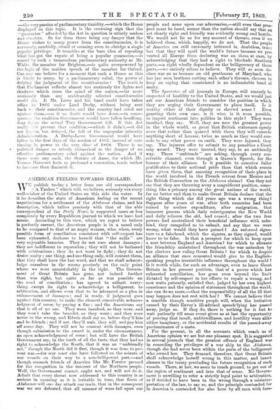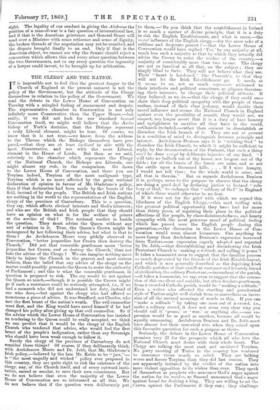AMERICAN FEELING TOWARDS ENGLAND.
WE publish to-day a letter from our old correspondent " A Yankee " which will, we believe, seriously vex every well-wisher of the United States on this side the water. In it he describes the state of American feeling on the recent negotiations for a settlement of the Alabama claims, and his description, which tallies precisely with that of the able correspondent of the Daily News, is supported more or less completely by every Republican journal to which we have had access. According to this view, which we regret to believe is perfectly correct, the American people is in a mood only to be compared to that of an angry woman, who, when, every possible form of conciliation consistent with self-respect has been exhausted, declares to herself that " the sulks " are very enjoyable luxuries. They do not care about damages ; they are indifferent to reparation ; they will not be bothered with arbitrations ; they do not want to fight; they do not desire amity ; one thing, and one thing only, will content them, that they shall have the last word, and that we shall acknowledge ourselves in the wrong precisely on the only point where we were unmistakably in the right. The Government of Great Britain has gone, not indeed further than was right, but quite as far as was possible on the road of conciliation ; has agreed to submit everything, except its right to acknowledge a belligerent, to arbitration, and allows even that to be advanced as a plea in enhancement of damages ; and is ready, if judgment goes against this country, to make the clearest conceivable acknowledgment of error, by paying a fine ; and the Americans say that is all of no use. They were insulted, so they were, and they won't take the bracelet, so they wont ; and they were never in the wrong, and Edwin shall say so, before they'll kiss and be friends ; and if not, they'll wait, they will, and pay him off some day. They will not be content with damages, even though submission to the award is, under the circumstances, an open acknowledgment of error ; but will have the British Government say, in the teeth of all the facts, that they had no right to acknowledge the South, that it was an "unfriendly act," though the North did it first, though it was done to prevent war,—for war must else have followed on the seizure of our vessels on their way to a non-belligerent port,—and though staunch friends of America like Mr. Forster pressed for the recognition in the interest of the Northern people. Well, the Government cannot, ought not, and will not do it. Admit that every threat now addressed to this country is as serious in meaning as it is irritable in tone, that fleets of Alabamas will one day attack our trade, that in the consequent war we are defeated, that all manner of woes fall upon our
people and none upon our adversaries,—still even that prospect must be faced, sooner than the nation should say that an act clearly right and friendly was evidently wrong and hostile. We would not lie so for any amount of threats, even if we believed them, which, happily, we do not. That the people of America are still extremely irritated is, doubtless, true; but that they will spoil the world's future because we prevented all Europe from declaring war on them at once, by acknowledging that they had a right to blockade Southern ports,—a right wholly dependent on the belligerency of those ports,—we entirely refuse to believe. They will as soon declare war on us because an old gentleman of Maryland, who has just seen brothers cutting each other's throats, chooses to keep on saying that eousinhood is an indissoluble bond of amity.
The Spectator, of all journals in Europe, will scarcely be suspected of hostility to the United States, and we would just ask our American friends to consider the position in which they are urging their Government to place itself. Is it
worthy either of their dignity or shrewd sense Even granting their own case, is it wise, is it even possible, to import sentiment into politics in this style ? They were insulted, they say. Well, they are now the greatest power in the whole world, so great that British statesmen openly avow that rather than quarrel with them they will concede anything short of honour, twice as much as they would concede to any other power on earth. They were injured, they say. The injurers offer to submit to any penalties a Court may award. They were treated, they say, in an unfriendly way. These " unfriends " are asking, through every conceivable channel, even through a Queen's Speech, for the honour of their alliance. Is it possible to conceive fuller gratification to their national pride than that which events have given them, that amazing recognition of their place in the world involved in the French retreat from Mexico and the British Convention on the Alabama claims? Can they not see that they are throwing away a magnificent position, something like a primacy among the great nations of the world, for no better end than to make Great Britain declare that the right thing which she did years ago was a wrong thing? Suppose after years of war, after both countries had been ruined by useless expenditure, after emigration, that immense process which daily reinvigorates the New World and daily relieves the old, had ceased ; after the two free powers had neutralized their beneficial influence with mankind, they compelled us to submit, and say that we were wrong, what would they have gained ? An enforced signature to a falsehood, which the signers, as they signed, would know to be false. Is that a prospect for which to keep open a sore between England and America? for which to alienatethe friendship maintained throughout the war unbroken by the electors now ruling Great Britain ? for which to despisean alliance that once cemented would give to the Englishspeaking peoples irresistible influence throughout the world I Is it worth while, for such an advantage, even to leave Great Britain in her present position, that of a power which has exhausted conciliation, has gone even beyond the limit dictated by self-respect in her efforts to repair a wrong, and now waits patiently, satisfied that, judged by her own highest conscience and the opinion of statesmen throughout the world, she can do no more,—that the responsibility of all the ill that may happen does not rest with her ? We cannot believe that a sensible though sensitive people will, when the irritation caused by their Envoy's ill-advised speechifying has passed away, judge so. If they do, there is nothing for it but towait patiently till some event gives us at last the opportunity of proving that insult, unfriendliness, and hostility were alike either imaginary, or the accidental results of the passed-away predominance of a caste.
For the present, in all the accounts which reach us of American opinion we see but one pleasant spot. It is suggested in several journals that the greatest offence of England wasin conceding the privileges of a war ship to the Alabama, though she had never been within the ports of the belligerent who owned her. They demand, therefore, that Great Britain shall acknowledge herself wrong in this matter, and insert clauses in the treaty precluding the future recognition of such vessels. There, at last, we seem to touch ground, to get out of the region of sentiment and into that of sense. No Government is unwilling to refer a strictly legal point to arbitration, or if decided to have been in the wrong through a misinterpretation of the law, to say so, and the principle contended for in America is contended for also here by all men with fore
sight. The legality of our conduct in giving the Alabama the position of a man-of-war is a fair question of international law, and if that is the American grievance, and General Grant will send over a Minister with some reticence and sense of dignity, the broken threads of the negotiation may yet be reunited, and the dispute brought finally to an end. Only if that is the American object, we cannot see why the Senate should reject a convention which allows this and every other question between the two Governments, not to say every question the ingenuity of a lawyer could invent, to be brought up for arbitration.



































 Previous page
Previous page